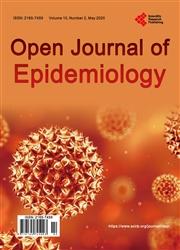Knowledge, Attitude and Practice of Adverse Pregnancy Outcomes Prevention among Women of Reproductive Age in Nasarawa Local Government Area, Kano State, Nigeria
引用次数: 0
Abstract
Background: Adverse pregnancy outcomes continue to contribute substantially to maternal mortality as well as poor maternal and fetal health outcomes whose burden can be reduced by the initiation of preventive behaviors like the uptake of maternal health services. This continuous unacceptably high maternal mortality justifies a need for progressive research to better understand the predictors of the preventive behaviors of women towards adverse pregnancy outcomes. This study was conducted to assess levels of knowledge, attitudes about adverse pregnancy outcomes and preventive practices among women of reproductive age in Nassarawa local government area, Kano State, Nigeria. Me-thodology: The study was a cross-sectional descriptive study that employed a four-sectioned pretested researcher administered questionnaire to collect data on knowledge, attitude and practice of adverse pregnancy outcomes prevention among 164 consenting respondents in Kano State, Nigeria between November 2020 and December 2020. Responses were transformed and computed using SPSS version 26 to generate descriptive statistics. Regression analysis was done to test the degree of association between the predictors and practice of adverse pregnancy outcomes prevention with the level of significance set at a cut-off of p ≤ 0.05. Results: The findings showed tively. The practice of adverse pregnancy outcomes prevention when assessed on a 15-point scale shows that respondents scored a mean of 7.42 ± 8.30 which denotes 53.4% of the level of prevention practice anticipated from the respondents. The study also showed a significant positive association between the level of knowledge (p = 0.010), attitude (p < 0.001) and prevention practice of adverse pregnancy outcomes. Conclusions: The findings reported an average but inadequate knowledge and neutral attitude that predicted unsatisfactory adverse pregnancy outcomes prevention practices among the examined reproductive-aged women, which calls for targeted health education on adverse pregnancy outcomes within the community in order to inform better prevention practices.尼日利亚卡诺州纳萨拉瓦地方政府区育龄妇女预防不良妊娠结局的知识、态度和做法
背景:不良妊娠结局继续在很大程度上导致孕产妇死亡以及孕产妇和胎儿健康状况不佳,这一负担可以通过采取预防性行为(如接受孕产妇保健服务)来减轻。这种持续的令人无法接受的高孕产妇死亡率证明有必要进行渐进式研究,以更好地了解妇女对不良妊娠结果的预防行为的预测因素。本研究旨在评估尼日利亚卡诺州Nassarawa地方政府地区育龄妇女对不良妊娠结果的知识水平、态度和预防措施。方法:该研究是一项横断面描述性研究,采用四部分预测试研究人员管理的问卷调查,收集2020年11月至2020年12月期间尼日利亚卡诺州164名同意受访者关于预防不良妊娠结局的知识、态度和实践的数据。使用SPSS version 26对响应进行转换和计算,生成描述性统计。采用回归分析检验预测因子与预防不良妊娠结局实践的相关程度,显著性水平设为p≤0.05。结果:研究结果明显。在15分制的预防不良妊娠结局实践评估中,受访者的平均得分为7.42±8.30,即受访者预期预防实践水平的53.4%。研究还显示,知识水平(p = 0.010)、态度(p < 0.001)与不良妊娠结局的预防措施之间存在显著正相关。结论:研究结果表明,在接受检查的育龄妇女中,平均但知识不足和中立的态度预测了不满意的不良妊娠结局预防措施,这要求在社区内对不良妊娠结局进行有针对性的健康教育,以便告知更好的预防措施。
本文章由计算机程序翻译,如有差异,请以英文原文为准。
求助全文
约1分钟内获得全文
求助全文

 求助内容:
求助内容: 应助结果提醒方式:
应助结果提醒方式:


